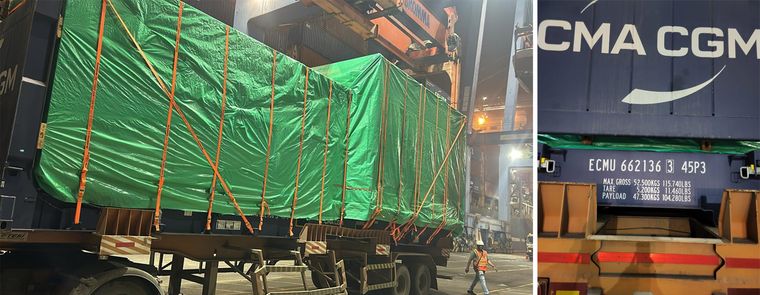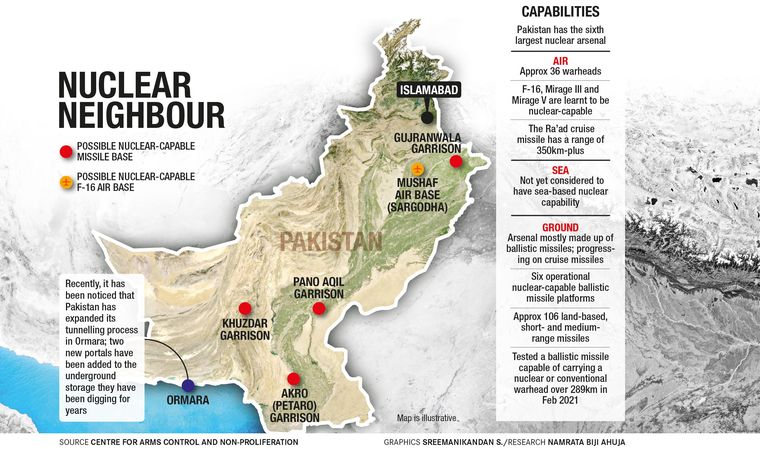Early this year, workers at the Shekou Port in southern China packed 22,180kg of cargo into containers and loaded it on the Malta-flagged merchant ship CMA CGM Attila scheduled to sail to Karachi. Despite the turbulent weather and the choppy waters, the voyage continued untroubled till January 23 when it crossed Mumbai’s Nhava Sheva Port.
In the last few years, Indian port authorities have been aggressively scanning the country’s 7,500km-long coastline across nine states. While the Navy is the lead intelligence agency for the high seas, the Coast Guard secures the territorial waters. And then there are multiple agencies like the Directorate of Revenue Intelligence (DRI) and the Customs to monitor maritime traffic.
The spies at sea were at work when Attila was nearing the Indian shores with its hefty consignment of computer numerical control (CNC) machinery, used in the manufacture of critical parts of aerospace and nuclear industry. They were keen to check the nature of the tightly-packed load. The captain was asked to furnish the paperwork. His documents showed Shanghai JXE Global Logistics Co Ltd as the consigner and Sialkot-based Pakistan Wings Pvt Ltd as the consignee. As per the website of Pakistan Wings, it is a leading sea and air freight consolidator and third party logistics provider.
But when Indian officials dug deeper, they found that the consignment was shipped by Taiyuan Mining Import and Export Co Ltd in Shanxi province of China and it was meant for Cosmos Engineering, a defence supplier in Pakistan. The DRI seized the consignment following suspicion that it could be dual-use cargo masked to assist Pakistan’s nuclear programme. THE WEEK broke the story on its website on March 2. The documents, bills and paperwork showed that identities were masked, and that entities sanctioned by the US Bureau of Industry and Security were behind the consignment. For Indian agencies, the worry was but natural. Was the consignment part of Pakistan’s weapons of mass destruction?
When there is suspicion of any consignment being of military grade, the Defence Research and Development Organisation is called in. DRDO experts confirmed that the machinery was of ultra-high precision category.
Further inspection has thrown up startling evidence of clandestine activities going on at sea. There is clear evidence of dubious paperwork to mask identities. Second, there is the involvement of Cosmos Engineering, which came under the radar of security agencies in 2022 as well. DRDO findings said the possibility of the equipment being used for Pakistan’s nuclear programme could not be ruled out.
The latest seizure has aggravated concerns about China’s continued assistance to Pakistan’s nuclear and ballistic missile programmes, and also points towards an international black market of nuclear technology where dual-use and restricted items are purchased from Europe and the United States allegedly by Chinese entities who are supplying them to Pakistan.
On March 3, the Chinese embassy in Delhi wrote on X that as a responsible, major country, it strictly fulfilled its international non-proliferation obligations. But an upset Pakistan foreign office said it was an innocuous case of “import of a commercial lathe machine by a Karachi-based commercial entity which supplies parts to the automobile industry in Pakistan”. Indian officials said if that was the case, there was no need to mask the real recipient of the consignment.
Smruti S. Pattanaik, research fellow at the Delhi-based Manohar Parrikar Institute for Defence Studies and Analyses (MP-IDSA), said Pakistan’s role as a repeat offender in adopting dubious means to build its nuclear and ballistic missile programmes was well documented. “This incident has demonstrated that nothing has changed. It appears that China’s behaviour is not driven by its economic commitment towards Pakistan. Instead, it is keeping a strategic hold through economic mortgaging and by creating dependency.” Pattanaik referred to the infamous A.Q. Khan network which clandestinely sold uranium enrichment centrifuge, nuclear designs and other technical know-how to countries like North Korea, Libya and Iran, revealing Pakistan’s role as a nuclear black marketeer.
“Today, China is giving free defence assistance to the Maldives. We have to see this in a larger context,” said Pattanaik. “In one part of the world we see the Americans enabling Ukraine to fight the war against Russia, and in the Indian subcontinent there is a parallel with China providing assistance to arm countries like Pakistan and creating its own space of advantage.”
This is not the first instance when Indian port officials have seized dual-use military grade items shipped from China to Pakistan. In March 2022, a consignment carrying Italian made thermoelectric instruments was interdicted at the Nhava Sheva Port during its transshipment to Karachi. In that case, too, Cosmos Engineering was acting as a consignee, officials said. Indian agencies learnt that the consignment was transshipped at the Singapore Port from a container ship, APL Antwerp, to a Hong Kong flagged vessel Xin Shanghai, destined for Karachi. The equipment was meant for a uranium enrichment facility in Pakistan, said Indian agencies.
In May 2023, a consignment of jacketed glass reactor and other key laboratory equipment from China, allegedly meant for Pakistan’s nuclear programme, was seized by Customs authorities at the Nhava Sheva Port. Indian agencies found that the consignee was Emerging Future Solutions Pvt Ltd, suspected to be a Rawalpindi-based shell company of Pakistan’s Defence Science and Technology Organization (DESTO), an entity sanctioned by the US Bureau of Industry and Security.
Another interception took place in February 2020, when a consignment of industrial autoclaves was seized from a Chinese vessel, Da Cui Yun, at the Kandla Port in Gujarat. Indian authorities said it was masked as a consignment of industrial drier, loaded at Jiangyin port in China and was meant for Port Qasim in Karachi. The consignment was hidden in the ship’s bottom cargo.
Continuing incidents of interdiction of dual-use technology, thermoelectric instruments and laboratory equipment have alerted Indian authorities about growing threats from “shadowy” nuclear technology commerce that possibly stretches to European and American shores as well. Ashok K. Behuria, security expert at the MP-IDSA, said the way the seized consignment was camouflaged showed that a lot of thinking had gone into it. “The involvement of shadowy players is worrisome as the global racket of nuclear commerce no longer limits itself to China and Pakistan. It is a wake up call for the entire global community.”
Even as Pakistan tries to make the latest interception as one of Indian “high handedness’’, Indian officials are aware of the diversionary tactics being employed to skirt the bigger questions that lie unanswered. Who are the real players behind such clandestine activities and who are the real beneficiaries? Global nuclear commerce falling into the hands of unscrupulous players indulging in illicit finance and money laundering has repercussions beyond the Indian subcontinent.
“Since the G20 summit in New Delhi, India has done well by demonstrating that it is not interested in regional hegemony by micromanagement,” said Pattanaik. There was a time when diplomats would be dispatched to neighbouring countries to mitigate concerns of regional instability every now and then. “India has now donned a larger role on global platforms, like facilitating the meeting between US President Joe Biden and Bangladesh Prime Minister Sheikh Hasina on its soil.”
The playground is much bigger now and New Delhi is successfully trying to balance global orders and mitigating global risks, whether on land or on sea.




